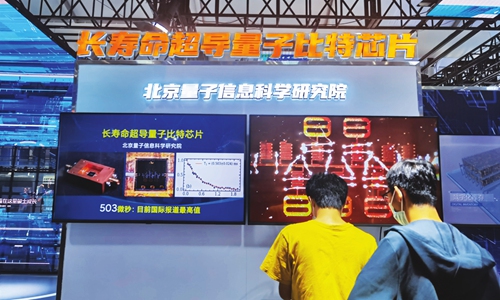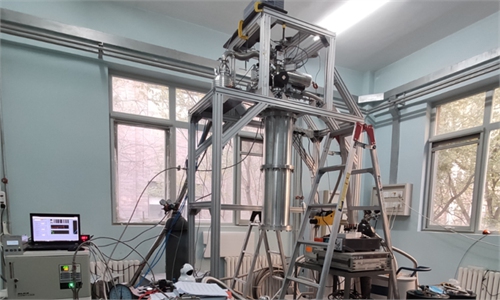
The long-life super conducting qubit chip exhibited at the 2021 Zhongguancun Forum on Friday in Beijing Photo: IC
Quantum information technology has become the focus of emerging technology attracting worldwide attention, igniting the second quantum revolution, which will have a profound impact on the global economy, social progress and human life.
China has been at the forefront of several quantum areas, and while there is still significant opportunity to pick up the pace of quantum development, China faces many difficulties, including enterprise and capital participation, level of basic research, talent cultivation and improving sector-wide industrial chains, experts said.
Quantum technology is the cornerstone of modern society. Quantum theory has a history stretching back more than100 years, and its development led to the first quantum revolution represented by semiconductor technology, scientists said at the Zhongguancun (ZGC) Forum held in Beijing from Friday to Tuesday.
New advances
China's latest advance of quantum technology was launched at the ZGC Forum - a long-life superconducting qubits chip, which can make qubit decoherence time reach 503 microseconds, a new world record.
This record-breaking decoherence time is expected to allow scientists to observe quantum processes or phenomena that could not be observed previously, laying a solid device foundation for the practicality of superconducting quantum computing.
The chip was launched by the Beijing Academy of Quantum Information Sciences (BAQIS), which said during the ZGC Forum that the advance represents that China has come to the forefront in the quality of superconducting quantum chips in the world.
As an embodiment of China's innovation-driven growth, ZGC - the country's first National Innovation Demonstration Zone - and the ZGC Forum - a national platform for global scientific and technological innovation exchanges and cooperation - shoulder a significant mission in pursuing national technological advances.
The ZGC Forum also outlined the latest progress and development direction of quantum computing, quantum communication, quantum precision measurement and other related frontiers.
Back in July, the Institute of Physics at the Chinese Academy of Sciences (CAS) successfully developed a refrigeration equipment that can provide an environment of near absolute zero without using liquid helium.
The temperature reached by the refrigerator is 10.9 millikelvins, or -273.14 C, only 0.01 degrees above absolute zero, a point at which a thermodynamic system has the lowest energy.
Qubit devices need to maintain superconductivity in chillers at very low temperatures, often close to absolute zero. Such refrigerator is necessary for quantum research and production, Wang Nanlin, deputy director of BAQIS, told the Global Times on Sunday, at the ZGC Forum.
"The implementation of quantum computing involves a large chain. For example, superconducting quantum computing, starting from materials, requires the preparation of superconducting qubit devices by micro-nano processing, and then maintaining superconducting state. Many institutions in China are developing cooling machines to provide low-temperature environment for quantum research and production," Wang said.
Institutes aside, enterprises have also made breakthroughs. QuantumCtek Co, for example, its independently developed Quantum Random Number Generator, named QRNG100E, has passed the commercial encryption detection of the State Cryptography Administration in July, which is the first quantum random number product that has passed such detection in China.
At present, there are many domestic manufacturers offering quantum key distribution products, such as QuantumCtek Co and Anhui Qasky Quantum Technology Co. Currently, a transmitter only matches the receiver from the same manufacturer, Yuan Zhiliang, chief scientist of Beijing Academy of Quantum Information Sciences, told the Global Times on Sunday at the ZGC Forum.
"Standards are necessary to inter-connect equipment from different vendors in the same network, and the industry is currently building these systems. The standard established will not be a comprehensive one at the beginning. Some important areas, such as components, will be the first area subject to standards," said Yuan, adding that the first series of standards are likely to be available within two or three years.
Challenges remain
Although China may be the world's leader in parts of this field, and has many innovative technologies and products on par with developed countries, scientists and analysts said that China should be clearly aware that in many areas, it is still lag behind, or is developing in parallel with other countries.
"China's scientific talent development has come much later than western countries. Chinese people are very diligent, and the government investment continues to increase, so as to keep pace. However, there are still gaps," Wang noted.
Apart from talent training, analysts also mentioned the US crackdown on China's technology development, such as the embargo of semiconductor equipment, which is crucial to the quantum technology.
A quantum institute based in Hefei, East China's Anhui province told the Global Times that Chinese enterprises have the 28-nanometer semiconductor production assembly lines. But those lines are mostly devoted to commercial chip production rather than research.
Analysts also noted that enterprises and investment institutions are necessary in the development of quantum technology in China.
"Funds and angel investors should enter the quantum industry. As they have done in the US. Their biggest push is to make quantum development profitable and make a connection between research and production. We should let the market decide. Otherwise, the industry cannot achieve a healthy development," You Li, professor of physics at the Tsinghua University and also research fellow of BAQIS, said on Sunday at the ZGC Forum.
Solutions
Scientists have stressed the importance of international exchanges to boost the development of quantum technology in China.
China is rich in investment and has huge market, whilst countries, like Denmark, Finland and New Zealand, are strong in basic research in which China requires further development, which can form complementary advantages.
"Quantum technology requires the joint efforts of many industries and areas, including materials, electronics, device processing, computing science and other technologies. Development in this area will benefit from international scientific collaboration and cooperation," Yuan said.
Experts also believe that China should establish the ecology of quantum field as soon as possible.
"Our application ecosystem is in the early exploratory stage, and most companies hope that the quantum computer will be used by enterprises after it is completed, which is not consistent with the current development model of quantum computing. We should upgrade and modify quantum computers as enterprises use them. This is the way to accelerate development," Guo Guangcan, academician of the CAS and professor at the University of Science and Technology of China, said on Sunday at the ZGC Forum.
According to scientists, the ultimate goal of a quantum computer is a universal machine, which is still a long way off. Quantum computers have the ability to outperform the best supercomputers in the world, but for now they are still specialized machines that can only be used t to tackle a single problem.
Guo explained that the US development model is to send such "immature" quantum computers to enterprises for actual application and exploration, and then research institutions receive feedback and modify the computers, which form a cycle to step forward technology and application.
The advantage of this model is that as dedicated quantum computers become more mature, more widely used and more efficient in this cycle, US companies will have many core technologies and will have an advantage in market dominance, Guo added.
"This is a model that China should learn from. However, the total number of quantum manufacturing enterprises in China is very small, and most of them are in the initial stage and growth stage," Guo noted.

